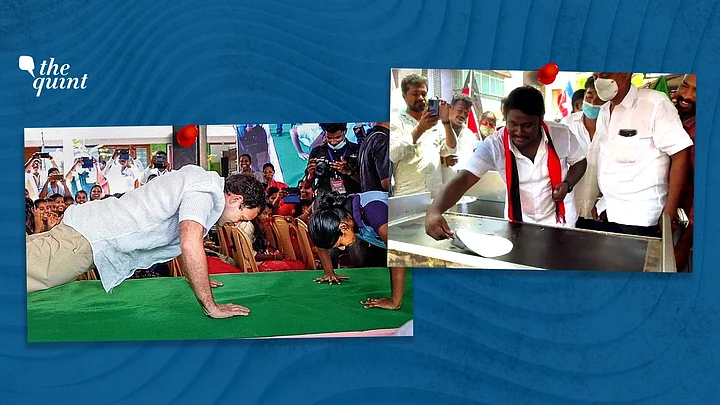The stage is ready, props, costumes, and the set are in place, and actors who have already been featured in a fair share of trailers are now ready for their final performance. As the curtain rises, and the lights fall on the performers, the audience is left in the dark – they have no option, but to absorb and be moved by the performance that will be staged before them.
One would see these elements being used on a stage by theatre artistes. Today, these very elements have been borrowed and put to good use by our politicians.
Be it Rahul Gandhi taking up the push-up challenge in Tamil Nadu, or the politics in Karnataka being referred to as another ‘nataka' (drama) when elections are around the corner in the state – the theatrics keep getting better.
Some other examples of theatrics include the loud war of words between politicians – like BJP state president Dilip Ghosh’s recent ‘bermuda shorts’ comment. There are still other examples of monologues delivered in the garb of political speech, which are in fact hate speeches, like Anurag Thakur’s ‘Desh ke gaddaron ko, goli maaro ****** ko.’
It doesn’t stop there, in Tamil Nadu an AIADMK candidate was seen washing clothes, making dosas, and even dressing up like 'Chhota Bheem,' 'Motu' and 'Patlu,' cartoon characters that are popular with children.
Facial expressions, voice modulations, costumes, and makeup are important tools for a theatre artiste. With these tools, theatre has been used as a powerful medium to enhance the consciousness of the masses for long.
Today, our politicians and news anchors have mastered these very skills and have learnt the art of keeping their audience entertained with their theatrics. People have now switched to watching news debates and politicians’ speech, not just to be informed, but to be entertained as well. But the important question here is, are they aware that their means of ‘entertainment’ and the actors they now watch have undergone a dramatic shift?
With politicians and news anchors staging theatrics and actors joining politics, where are our good old ‘original’ theatre artistes?
Zafer Mohiuddin, a veteran theatre artiste in Bengaluru claims that theatre as an art form is still alive and there are many who are passionate about it. However, “It has been going extinct due to the emerging new mediums. People cannot afford theatre productions and it is very difficult to get audience willing to pay and watch our show. The central government is not interested in funding art and culture. Instead it charges a hefty GST on tickets. In such a scenario, it has become very difficult for theatre artistes to sustain a living.”
Ashish Sen, a veteran theatre artiste based in Bengaluru, speaks about the importance of art and artistes in today’s political climate.
He says, “We are living at a time when people are using language very carefully because of the overriding, unsaid sense of censorship. In such times, what are artistes doing?”
With little or no earning and with the theatre community trying to see how they can continue to be relevant and sustain themselves, the artistes have more pressing priorities. Perhaps a lack of aid here is why there is no resistance from this community, as it has become a matter of survival now.
Sen goes on to say that the idea of mixed media is being used by many artistes now.
“Community radio stations have developed new genres and formats, looking at a cross-media approach to bring about behaviour changes and to expose vulnerability, equity, prejudices, and stigma in our society. Standup comedy is a case in point. While it is a relatively new genre for community radio stations, some of them have been using it very powerfully to impact behaviour change in society.”Ashish Sen, veteran theatre artiste
Do Actors Join Politics to Bring About Change?
“Everybody should be politically aware. Let actors come too. They should have an ideology to do work for. Everybody should come out to the streets, something that used to happen earlier. Now, everyone is being bought,” Mohiuddin states, when asked about the trend of actors joining politics.
Actor-turned-politician Saayoni Ghosh, who is known to be very vocal about issues, has also decided to get into active politics. The actor who was recently embroiled in a controversy with a BJP MP, allegedly received death threats and was subjected to trolling, has been fielded as the TMC candidate from Asansol South in the West Bengal Assembly elections.
“Actors can also be interested in public life and politics. What happens after that is important. How far can one take it and how long one can keep up with the commitment is the question,” Ghosh says.
As the World celebrates Theatre Day on 27 March, the first phase of Assembly elections commences in Assam and West Bengal. The winning actors of this ‘theatre festival’ will be announced on 2 May.
